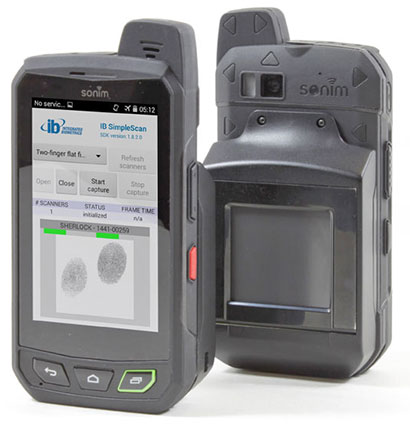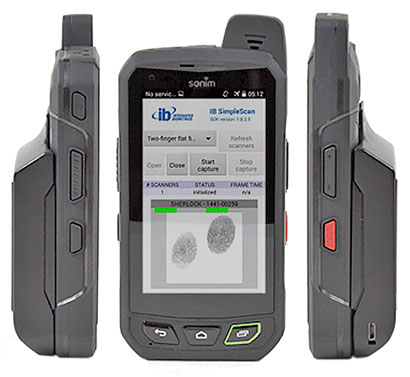|
AMREL XP7-ID
An ultra-rugged biometric Android smartphone
(by Conrad H. Blickenstorfer)
On March 30, 2016, AMREL announced FBI certification of the AMREL XP7-ID, which the company calls "the world's most rugged biometric handheld." What we're talking about here is a combination of an AMREL-branded Sonim XP7 ultra-rugged smartphone with a specialized fingerprint sensor from Integrated Biometrics, resulting in a customized, mobile biometric solution.

What is an integrated biometric solution? In this case an ultra-rugged and reasonably close to state-of-the-art smartphone from a reputable vendor with a sophisticated, reliable fingerprint capture module from a company that specializes in so called "enrollment and verification" fingerprint sensors. The combo can be used not only for secure access, but also for verifying identity out there in the field.
What makes this solution special? Aren't fingerprint readers pretty much standard technology? Yes, as simple password complements or replacements. But the technology used in the much more sophisticated "enrollment and verification" approach is an entirely different matter. Here, the commonly used optical and silicon fingerprint technologies aren't good enough, and certainly not out there in the field where scanners must be able to handle indirect or direct sunlight, dusty conditions, as well as dry, wet or dirty fingers. And that's where the Integrated Biometrics folks come in.

So what does "FBI-certified FAP-45 EFT" mean? Well, the US government has a fingerprint image quality specification that's managed by the FBI and its testing consultants. There's an Appendix F that describes the most stringent image standards. FAP stands for "fingerprint acquisition profile" and the "45" refers to both the specification used as well as the sensor's size, which for FAP-45 is 1.6 x 1.5 inches. Why is size important? Because larger sizes can handle two fingers at the same time, which some databases require. It quickly gets pretty deep here, but suffice it to say that the Integrated Biometrics Appendix F FAP-45 "Sherlock" two-finger roll scanner with its patented Light Emitting Sensor (LES) film used in the AMREL XP7-ID works with a large variety of enrollment and verification databases and systems.
What about the phone itself? Sonim has been selling the XP7 since late 2014 as a mission-critical solution smartphone, so it's a great donor device and starting point for AMREL. Its 5.4 x 2.8 inch footprint is roughly that of the iPhone 6 (that's the smaller of Apple's two large-screen phones). It's 0.8 inches thick, but the bolt-on biometric scanner in the AMREL XP7-ID version adds another 0.6 inches. The whole thing weighs 13.6 ounces, hefty by consumer phone standards, but we're talking ultra-rugged here.
The XP7 has a 4-inch procap touchscreen that works with gloves and in wetness. The screen's "blanview" technology, which I believe was pioneered by Casio, claims a brighter image outdoors without the need for a strong backlight. 800 x 480 pixel resolution means 233 pixels per inch, a bit sharper than what you get on a "retina" Apple MacBook Pro. Processing power comes from a quad-core 1.2GHz Qualcomm MSM8926 "Snapdragon" chip. Onboard I/O includes a standard 3.5mm audio jack and a not-so-standard magnetic USB/charger port. There is, however, a 12-pin connector on the back that accommodates AMREL proprietary Flexpedient extra functionality solutions. Onboard storage is 16GB, with 12GB available to the user. That's not very much, especially since there's no card slots to complement storage.
Ruggedness includes IP68 sealing, which means it's completely dust- and waterproof, including extended immersion. The operating temperature range is a wide -4°F to 131°F (-20°C to 55°C). The rubberized case feels solid, there are protective covers for all ports that can be secured with screws, and the device is said to be able to handle corrosive chemicals and oils, extreme pressure, as well as severe vibration and shocks. Unfortunately, while there's a general reference to MIL-STD-810G testing, there are no specifics in the specs.
On the communications side there is dual-band 802.11a/b/g/n/r WiFi, Bluetooth 4.0/BLE, push-to-talk and NFC. There's also mobile broadband and support for the Firstnet and P-25 networks.
All of this means that the AMREL XP7-ID is an Android-based capacitive multi-touch smartphone that was not only designed from the ground up as an ultra-rugged device, but has also been customized to address the advanced biometric verification needs of certain defense, public safety, and industrial markets. And AMREL's Flexpedient expansion technology means the device can also be used with other modules as they become available.
Based in El Monte, California, AMREL (AMerican RELiance) has a long history of offering value-added applications in vertical markets. The Rocky line of ruggedized computers was introduced in 1995 and has been updated, enhanced, and fine-tuned every since. AMREL also offers innovative rugged handhelds and tablets for both military and industrial applications.
|



